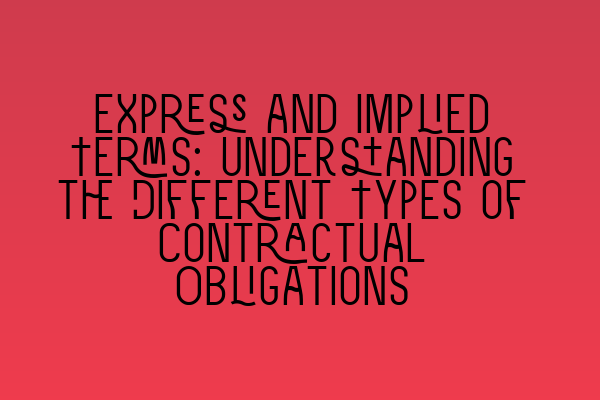Express and Implied Terms: Understanding the Different Types of Contractual Obligations
In the world of contract law, understanding the different types of contractual obligations is crucial. Contracts are a fundamental part of any business or personal transaction, and they govern the rights and responsibilities of the parties involved. One essential aspect of contracts is the inclusion of terms that outline these obligations. These terms can be categorized into two main types: express terms and implied terms. In this blog post, we will explore the differences between these two types of contractual obligations and their importance in legal agreements.
Express Terms: The Backbone of Contractual Obligations
Express terms are exactly what their name suggests – they are terms that are explicitly stated and agreed upon by the parties involved in a contract. These terms can be written, oral, or even implied from the conduct of the parties. However, it is generally recommended to have express terms in writing, as they provide a clear and tangible reference point for all parties.
Examples of express terms include:
1. Price: The agreed-upon price for goods or services is an express term that is often stated explicitly in contracts. This ensures that both parties are aware of the financial aspects of the agreement.
2. Delivery Date: In contracts that involve the delivery of goods or completion of a project, the expected delivery date is an express term that outlines when the goods or services should be provided.
3. Payment Terms: The manner in which payment should be made, such as in installments or upfront, is an express term that protects the interests of both parties involved.
Express terms are crucial as they provide clarity and help prevent misunderstandings or disputes. By clearly outlining the rights and responsibilities of each party, express terms ensure that both parties are on the same page and can refer to the terms if any issues arise during the course of the contract.
Implied Terms: The Unspoken Obligations
While express terms are the backbone of contractual obligations, there are situations where certain obligations may not be expressly stated but are still considered to be a part of the contract. These obligations are known as implied terms and are deemed to be incorporated into the contract based on law, custom, or the intentions of the parties.
Implied terms can be categorized into three main types:
1. Terms Implied by Statute: Certain terms are implied into contracts by virtue of legislation. For example, in consumer contracts, the Sale of Goods Act 1979 implies terms that goods should be of satisfactory quality and fit for their purpose.
2. Terms Implied by Custom: In some industries or trades, certain terms are considered to be customarily included in contracts within that specific field. These terms can be implied based on the longstanding practices and customs of the trade.
3. Terms Implied by Courts: Courts may imply certain terms into contracts to give effect to the intentions of the parties or to fill gaps where the contract is silent. These implied terms are generally based on the reasonable expectations of the parties.
Implied terms play a vital role in ensuring fairness and the smooth operation of contracts. They provide a safety net by addressing issues that may not have been expressly considered by the parties. Implied terms are especially important when contracts are silent on crucial matters that are essential to the overall understanding and performance of the contract.
The Importance of Understanding Express and Implied Terms
Understanding the different types of contractual obligations is paramount for both solicitors and clients. By clearly outlining express terms, solicitors can ensure that their clients’ rights and responsibilities are protected. Furthermore, understanding implied terms and their implications allows solicitors to craft contracts that reflect the true intentions of the parties and comply with relevant laws and customs.
For clients, understanding express and implied terms enables them to enter into agreements with peace of mind. It allows them to have a clear understanding of their rights and obligations, reducing the risk of disputes or legal issues down the line.
In conclusion, express and implied terms form the foundation of contractual Obligations. Express terms provide clear and explicit guidelines for the parties and are crucial in preventing confusion and disputes. On the other hand, implied terms fill in the gaps and ensure fairness in situations where certain obligations are not expressly stated. Understanding both types of terms and their implications is essential for a successful and legally sound contract.
For more information about SQE preparation, visit our related articles:
– SQE 1 Practice Exam Questions
– SQE 1 Practice Mocks FLK1 FLK2
– SQE 2 Preparation Courses
– SQE 1 Preparation Courses
– SRA SQE Exam Dates
At SQE Contract Law, we strive to help aspiring solicitors understand and excel in contract law. Contact us today to learn more about how we can assist you in your SQE preparation.
